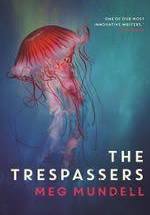Just finished Meg Mundell’s The Trespassers (UQP 2019), which I read obsessively and breathlessly in almost one sitting. Poignant, timely, compelling and bursting with meaning comparative with our current world, this is a fast-paced and tense crime novel, a well-crafted literary tale, and a heartfelt message of our times.
We are currently in the midst of the Corona Virus pandemic, and so it was surreal to begin reading this prescient story of a world set only a few years in the future, with a viral outbreak causing death and illness, shutting down whole countries’ economies, prompting divisive and hatred-filled finger-pointing, panic-buying and mass hysteria. It felt like life literally replicating as the art I was reading. That is the first amazing thing about this book – that it was published last year, and yet if anyone was to read it right now, today, they would be forgiven for thinking Meg Mundell had just penned this last night. It is scarily predictive and frighteningly familiar.
The story centres on three main characters and is narrated from their perspectives: nine-year-old Cleary, hoping for adventure; former nurse Billie who is running from her past; and schoolteacher Tom who yearns for a better life. All three are passengers on the Steadfast, a vessel loaded with migrant workers keen to flee the pandemic-stricken UK and to escape to a better life on the other side of the world, in Australia. The hundreds of passengers and crew have been bio-screened and virus-tested to ensure that none carry contagion. And although they know little about the circumstances of virtually indentured labour towards which they are heading, they feel confident it must be a better life than the situation that they are leaving.
But the long journey is interrupted early on with the suspicious death of a crew member, and soon afterwards, despite the many safety biohazard procedures and protocols in place, passengers begin falling sick. With everyone stuck on board the ship in the middle of the ocean, shunned by the world as a contagion carrier or even a floating death trap (again, sounding familiar?), law and order breaks down and chaos descends. As the secrecy, lies and coverups continue, Cleary, Billie and Tom are thrown together in unexpected ways, drawn towards each other even though they are strangers with very different backgrounds. No-one knows who to trust, and the authorities prove themselves time and again to be duplicitous and deceptive.
The second amazing thing about this book is the way it seamlessly morphs into an indictment of Australia’s own offshore detention centres – or in reality, our offshore prisons. I have only just read Behrouz Berchani’s No Friend But the Mountains, and the comparison between his real-life account of life on Manus Island and Meg Mundell’s account of a similar, if fictional, place, is astounding. If you have read one, I urge you to read the other. The other book that came to mind while reading this was Rohan Wilson’s Daughter of Bad Times – if you appreciated that novel’s depiction of money-hungry private corporations controlling the world’s labour, resources and production, patrolled by privately-funded military might, then The Trespassers will also resonate.
As it races towards its shocking conclusion, the novel becomes more and more nail-biting with every turn of the page. Without giving any spoilers, I can say that the ending asks more questions than it answers; while on one level it appears satisfying to a certain extent, on another level it leaves possibly sinister resounding echoes. It left me anxious and fearful.
The Trespassers includes themes of greed, global manipulation and control, migration and border security fears, exile, belonging, and the age-old search for a safe place to land. The messages in this novel, both overt and subtle, and the themes it addresses, are multilayered and complex. But they are brought into sharp focus by the spotlight on the main characters, who are well-drawn and defined, engaging and moving. This is a book filled with compassion and with wise questions about who we are as a country and as a global population, how far we would go in the face of fear and how deeply the roots of corruption and political and economic greed are spread. By confronting us with issues of corporate and nationalistic domination, and contempt for the most basic needs – food, shelter, medical care, security – it asks us all: where is our humanity?

